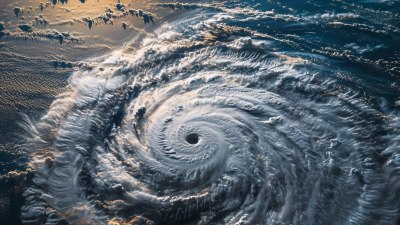What If All the Ice on Earth Melted Overnight: The Weather Fallout
Exploring the catastrophic impacts of an overnight ice melt on Earth's climate and weather patterns.

This image was created with the assistance of Freepik
Imagine waking up one morning to find that all the ice on Earth has melted overnight. The vast glaciers, polar ice caps, and even the ice sheets of Antarctica and Greenland have vanished. This scenario, while seemingly far-fetched, raises serious questions about the implications for our planet's climate and weather. The fallout would be overwhelming and multifaceted, affecting sea levels, weather patterns, ecosystems, and human society.
The Immediate Consequences
The most obvious immediate consequence of such an unprecedented event would be a dramatic rise in sea levels. Estimates suggest that the complete melting of all the ice on Earth could lead to a sea level rise of approximately 70 meters (around 230 feet). Coastal cities such as New York, Miami, and Tokyo would be submerged, displacing billions of people and creating a massive refugee crisis.
Global Temperatures and Weather Patterns
With the disappearance of ice, the planet would absorb significantly more sunlight, driving up global temperatures further. This would exacerbate the existing issues of climate change, leading to more severe weather patterns. Regions that once enjoyed mild, temperate climates could face ruthless storms, heat waves, and unpredictable rainfall. The balance of weather systems, shaped over millennia, would be irrevocably altered.
Impact on Ocean Currents
The melting of polar ice would also disrupt ocean currents, which play a crucial role in regulating global climate. The Gulf Stream, for instance, could be significantly affected, leading to extreme weather conditions in Europe and North America. Such disruptions may cause stronger hurricanes in the Atlantic and unusual cold temperatures in regions typically warmed by ocean currents.
Effects on Wildlife and Ecosystems
The meltdown would have severe implications for wildlife and ecosystems. Many species, particularly those dependent on ice habitats like polar bears and seals, would face extinction. Ecosystems that rely on stable climates and seasonal changes would experience shifts that could result in a loss of biodiversity. Coral reefs, already under threat from rising temperatures, would face additional stress from changes in salinity and water temperature.
Societal and Economic Fallout
Human society would not remain untouched by such drastic changes. Agricultural systems would suffer greatly due to altered weather patterns, creating food shortages and skyrocketing prices. Countries unaccustomed to such changes would struggle to adapt, leading to economic downturns and potential conflicts over resources. Governments would need to develop rapid response strategies to address both immediate and long-term challenges.
Slow Onset vs Rapid Change
It’s essential to differentiate between slow-onset climate change and this hypothetical rapid change. While the gradual melting of ice has been linked to climate change, an overnight meltdown would not allow for adaptation. Societies and ecosystems would lack the time needed to adjust, resulting in more catastrophic implications.
Long-term Climate Implications
In the long run, the planet would enter a different climatic phase. With the ice gone, new weather patterns would emerge that could redefine regional climates. Some areas may become lush with vegetation, while others could turn into arid deserts. This shift would reshape not only the natural world but also human settlements and liveability across the globe.
Climate Engineering Considerations
In light of such a scenario, discussions around climate engineering could gain traction. Proposals could include geoengineering projects aimed at reflecting sunlight to mitigate warming or carbon capture methods to deal with excess atmospheric CO2. However, these solutions come with their own set of ethical and ecological dilemmas. Would the risks outweigh the potential benefits?
The Role of Policy and Governance
Climate policy would become more crucial than ever. Nations would need to cooperate on unprecedented scales to handle the challenges posed by such vast changes. International agreements could be pivotal in ensuring that collaborative actions are taken to mitigate these impacts and prepare for resilient infrastructure development.
Public Awareness and Education
The urgency of climate change and the potential for its abrupt consequences would necessitate a shift in public awareness and education. Engaging communities in understanding environmental science and climate risks will empower them to adapt to and prepare for changes. Educating future generations will be key to fostering innovative solutions and resilient mindsets when facing climate challenges.
The thought experiment of all the ice on Earth melting overnight reveals the fragility and interconnectedness of our planet’s systems. It underscores the immediate need for action in combating climate change, preserving our natural environments, and equipping societies to deal with likely futures. Preventing this scenario should be a priority for everyone on the planet; understanding its consequences showcases the urgency of climate action.











